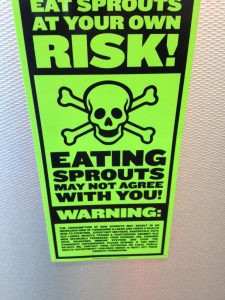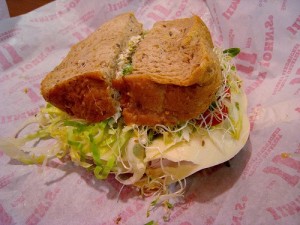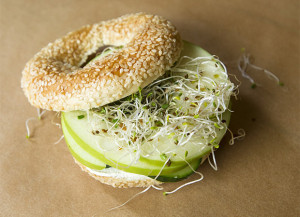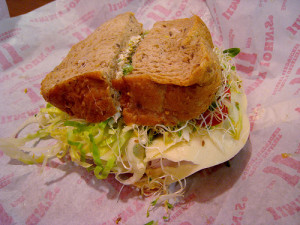The U.S. Centers for Disease Control reports that as of April 22, 2020, this outbreak linked to clover sprouts appears to be over.
 51 people infected with the outbreak strain of E. coli O103 were reported from 10 states.
51 people infected with the outbreak strain of E. coli O103 were reported from 10 states.
3 people were hospitalized. No deaths were reported.
Epidemiologic, traceback, and laboratory evidence indicated that clover sprouts were the source of this outbreak.
On March 16, 2020, Chicago Indoor Garden recalled external icon all products containing red clover sprouts. More information about this recall is available on the FDA website.external icon
Jimmy John’s LLC reported that all of its restaurants stopped serving clover sprouts on February 24, 2020.
People usually get sick from Shiga toxin-producing E. coli (STEC) 1 to 10 days (average of 3 to 4 days) after swallowing the germ.
Symptoms vary, but often include severe stomach cramps, diarrhea (often bloody), and vomiting. Some people may have a fever, which usually is not very high (less than 101˚F/38.5˚C).
Some people with a STEC infection may get a type of kidney failure called hemolytic uremic syndrome (HUS).
Antibiotics are not recommended for patients with suspected E. coli infections until diagnostic testing can be performed and E. coli infection is ruled out. Some studies have shown that administering antibiotics to patients with E. coli infections might increase their risk of developing HUS, and a benefit of treatment has not been clearly demonstrated.
 CDC, public health and regulatory officials in several states, and the U.S. Food and Drug Administration (FDA) investigated a multistate outbreak of E. coli O103 infections linked to clover sprouts.
CDC, public health and regulatory officials in several states, and the U.S. Food and Drug Administration (FDA) investigated a multistate outbreak of E. coli O103 infections linked to clover sprouts.
Public health investigators used the PulseNet system to identify illnesses that were part of this outbreak. PulseNet is the national subtyping network of public health and food regulatory agency laboratories coordinated by CDC. DNA fingerprinting is performed on E. coli bacteria isolated from ill people by using a standardized laboratory and data analysis method called whole genome sequencing (WGS). CDC PulseNet manages a national database of these sequences that are used to identify possible outbreaks. WGS gives investigators detailed information about the bacteria causing illness. In this investigation, WGS showed that bacteria isolated from ill people were closely related genetically. This means that people in this outbreak were likely to share a common source of infection.
A total of 51 people infected with the outbreak strain of E. coli O103 were reported from 10 states. A list of the states and the number of cases in each can be found on the Map of Reported Cases.
Illnesses started on dates ranging from January 6, 2020, to March 15, 2020. Ill people ranged in age from 1 to 79 years, with a median age of 29 years. Fifty-five percent of ill people were female. Of 41 ill people with information available, 3 were hospitalized and no deaths were reported.
WGS analysis of isolates from 39 ill people was performed; the isolate from 1 ill person predicted antibiotic resistance to streptomycin, sulfisoxazole, tetracycline, and trimethoprim-sulfamethoxazole, and 38 isolates from ill people did not show evidence of antibiotic resistance. Standard antibiotic susceptibility testing by CDC’s National Antimicrobial Resistance Monitoring System (NARMS) laboratory is currently underway. These findings do not affect treatment guidance since antibiotics are not recommended for patients with STEC O103 infections.
Investigation of the Outbreak
Epidemiologic, traceback, and laboratory evidence indicated that clover sprouts were the source of this outbreak.
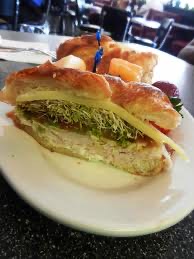 In interviews, ill people answered questions about the foods they ate and other exposures they had in the week before their illness started. Eighteen (56%) of 32 people interviewed reported eating sprouts. This percentage is significantly higher than results from a survey pdf icon[PDF – 787 KB] of healthy people in which 8% reported eating sprouts in the week before they were interviewed.
In interviews, ill people answered questions about the foods they ate and other exposures they had in the week before their illness started. Eighteen (56%) of 32 people interviewed reported eating sprouts. This percentage is significantly higher than results from a survey pdf icon[PDF – 787 KB] of healthy people in which 8% reported eating sprouts in the week before they were interviewed.
Seventeen (63%) of 27 people interviewed reported eating sprouts at a Jimmy John’s restaurant. Jimmy John’s LLC reported that all of their restaurants stopped serving clover sprouts on February 24, 2020. Clover sprouts are no longer available at Jimmy John’s restaurants.
Additionally, FDA identified the outbreak strain of E. coli O103 in samples of Chicago Indoor Garden products that contain sprouts. On March 16, 2020, Chicago Indoor Garden recalledexternal icon all products containing red clover sprouts.
FDA’s traceback investigationexternal icon showed that a common seed lot was used to grow both the sprouts recalled by Chicago Indoor Garden and sprouts that were served at some Jimmy John’s locations. The same seed lot was also used to grow sprouts linked to an outbreakexternal icon of the same strain of E. coli O103 infections in 2019.
As of April 22, 2020, this outbreak appears to be over.

